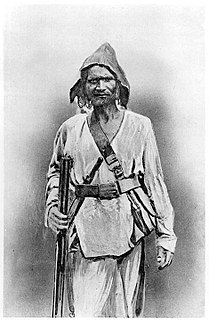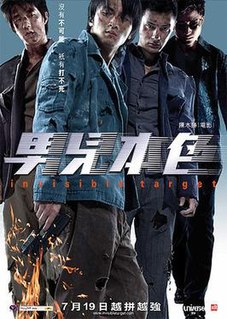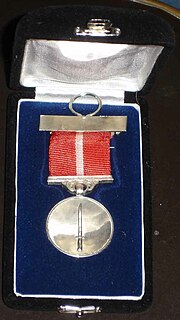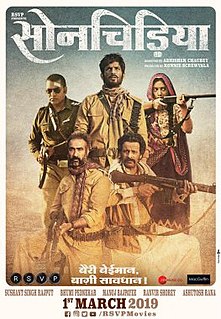
Dacoity is a term used for "banditry" in Bengali, Odia, Hindi, Kannada and Urdu. The spelling is the anglicized version of the Hindustani word, and as a colloquial Indian English word with this meaning, it appears in the Glossary of Colloquial Anglo-Indian Words and Phrases (1903). Banditry is criminal activity involving robbery by groups of armed bandits. The East India Company established the Thuggee and Dacoity Department in 1830, and the Thuggee and Dacoity Suppression Acts, 1836–1848 were enacted in British India under East India Company rule. Areas with ravines or forests, such as Chambal and Chilapata Forests, were once known for dacoits.

Phoolan Devi, popularly known as "Bandit Queen", was an Indian bandit and later a Member of Parliament.
The Lufthansa heist was a robbery at John F. Kennedy International Airport on December 11, 1978. An estimated $5.875 million was stolen, with $5 million in cash and $875,000 in jewelry, making it the largest cash robbery committed on American soil at the time. In popular culture, it is the main subject of two well-known television films—The 10 Million Dollar Getaway (1991) and The Big Heist (2001)—and is a key plot element in the film Goodfellas (1990). The heist's magnitude made it one of the longest-investigated crimes in the United States; the latest arrest associated with the robbery was made in 2014. Jimmy Burke was reputed to be the mastermind of the robbery, but he was never officially charged in connection with the crime.
"Encounter killing" is a term used in South Asia, especially India and Pakistan since the late 20th century to describe killings by the police or the armed forces, allegedly in self-defence, when they encounter suspected gangsters or terrorists. In the 1990s and the mid-2000s, the Mumbai Police used encounter killings to attack the city's underworld, and the practice spread to other large cities. In Pakistan, the Sindh Police is notorious for extrajudicial killings through fake encounters especially in Karachi.
Caste-related violence has occurred and occurs in India in various forms. According to a report by Human Rights Watch, "Hindus continue to face discrimination, exclusion, and acts of communal violence. Laws and policies adopted by the Indian government provide a strong basis for protection, but are not being faithfully implemented by local authorities."
Shiv Kumar Patel, also known as Dadua, was a notorious dacoit (bandit) who operated in ravines and forests on the borders between the Indian states of Uttar Pradesh and Madhya Pradesh.

Invisible Target is a 2007 Hong Kong action film written, produced and directed by Benny Chan. The film stars Nicholas Tse, Jaycee Chan and Shawn Yue as three police officers who are thrown together due to their backgrounds to bring down a gang of seven criminals led by Tien Yeng-seng.

Aag Hi Aag is a 1987 Bollywood action film directed by Shibu Mitra, starring Dharmendra, Shatrughan Sinha, Moushumi Chatterjee, Chunky Pandey, Neelam and Vinod Mehra. The film surfaced as one of the biggest hits of the year, becoming the fourth-highest-grossing film of 1987.
Ram Kasam is a 1978 Bollywood action film directed by Chand, with music by Sonik Omi and lyrics by Verma Malik. The film is based on the Dacoity of the Chambal division; bandits of Morena and Chambal, thronging the locales of the mountainous valleys of the Chambal River. It has Sunil Dutt in a double role; as a simpleton, and as a dacoit, with love interests as Bindiya Goswami and Rekha. The film is an inspiring tale portraying ritualistic Hinduism, and characters who show traits of their bloodline irrespective of the social setup that they have been forced into.

Bishnu Shrestha is a Nepalese Gurkha soldier in the Indian Army and recipient of the Sena Medal for bravery, and the Uttam Jeevan Raksha Padak medal, both awarded for his gallant conduct during an armed train robbery.
Seema Parihar is a former bandit and an Indian politician. She is a member of the Samajwadi Party. Parihar claims that her inspiration is Phoolan Devi, who was known as the Bandit Queen, and had also been a bandit before becoming a politician. She was a contestant in Bigg Boss in 2010.

Muladi massacres were a series of massacres of unarmed Hindu and Christian men and elderly women in the river port of Muladi between 17 and 20 February 1950 by armed mobs with the active connivance of the Ansars and the police.
Rape in Pakistan came to international attention after the politically sanctioned rape of Mukhtaran Bibi. The group War Against Rape (WAR) has documented the severity of rape in Pakistan, and the police indifference to it. According to Women's Studies professor Shahla Haeri, rape in Pakistan is "often institutionalized and has the tacit and at times the explicit approval of the state". According to lawyer Asma Jahangir, who was a co-founder of the women's rights group Women's Action Forum, up to seventy-two percent of women in custody in Pakistan are physically or sexually abused.
Chaddi Baniyan gang refers to certain organized criminal gangs in several parts of India. The Chaddi Baniyan Gangs are violent gangs who attack wearing only underclothes which in the local language are referred to as chaddi or kachcha whose literal translation in English is underwear and baniyan translates to vests. They often mask their faces. They put oil or mud on their body as lubricants which makes it hard to capture them.

Kachche Heere is a 1981 Bollywood Hindi Action film directed by Narender Bedi, starring Feroz Khan, Reena Roy, Danny Denzongpa, Aruna Irani and Shakti Kapoor. The movie was produced by Netra Pal Singh and the music was composed by Rahul Dev Burman. The film was somewhat a sequel to the 1974 Blockbuster Khote Sikkay. The film had the same star cast and almost the exact story line. Among few changes were that Ranjeet was replaced by Shakti Kapoor.
Darbara Singh was an Indian serial killer, who has been convicted for two murders.

Theeran Adhigaaram Ondru or simply Theeran is a 2017 Tamil action thriller film written and directed by H. Vinoth and produced by S. R. Prakashbabu and S. R. Prabhu of Dream Warrior Pictures. The story is based on true events from the Operation Bawaria case, which involved the nefarious activity of dacoits and its eventual containment by Tamil Nadu police. Karthi and Rakul Preet Singh play the lead roles in this movie, while Abhimanyu Singh played the prime antagonist. The film was released on 17 November 2017. Karthi received Filmfare Critics Award for Best Actor – South and nominated Filmfare Award for Best Actor – Tamil. It was dubbed into Hindi as Theeran by Goldmines Telefilms.
Operation Bawaria was an operation in southern India against organized dacoity, murder and robbery that were prevalent in residential areas near the National Highway during 1995 - 2006. The Bawaria gang was involved in crimes in multiple states. They were also called as the Lorry Gang.

Sonchiriya is a 2019 Indian action film directed by Abhishek Chaubey and starring Sushant Singh Rajput, Bhumi Pednekar, Manoj Bajpayee, Ranvir Shorey and Ashutosh Rana. The film presents a rooted tale set in Chambal. The film was released on 1 March 2019 to very less screens i.e. 720 in India and 220 in overseas circuit, making it 940 screens worldwide. The film had generally positive reviews from critics.










